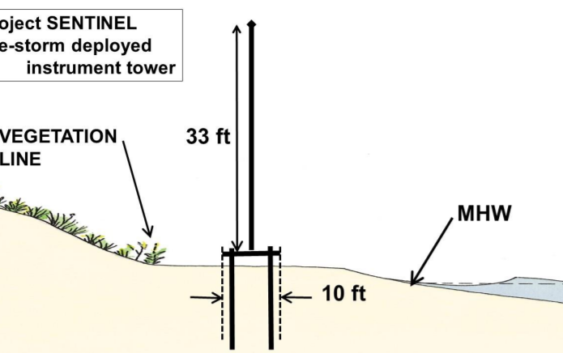- South and Midwest face potentially catastrophic rains and floods while reeling from tornadoes
- Deadly 2024 hurricanes prompt WMO to retire three names
- Body recovered in North Carolina identified as East TN man who has been missing ever since Hurricane Helene
- Report: Coastal flooding could threaten 1.4 million homes by midcentury
- Caught on camera | Tornado touches down in Missouri
New hurricane sensor technology could come to the Cape Fear ahead of the next storm

NEW HANOVER COUNTY, NC (WWAY) — There are just 9 weeks remaining in official hurricane season, but new sensor technology is ready if we get a late-season storm in the Cape Fear.
The University of Florida is partnering with North Carolina Sea Grant to bring a 33-foot hurricane sensor tower to Wrightsville Beach before the next storm strikes.
“We have one tower under construction now, and we’re planning for two more, probably next year,” NC Sea Grant geologist Spencer Rogers said. “A late season storm we may be able to catch with the unit that’s just about finished down in Gainesville, Florida now.”
Rogers says they will install the towers 2 to 3 days before landfall and remove them when the storm subsides.
“These are intended to be installed on the beach. So the conditions are much harsher. They have to deal with storm surge, waves and erosion.”
Rogers says this technology is still being developed but will provide valuable information, measuring wind speed, storm surge and wave heights in real time.
“In order to understand what I see when I go out into the field and around the country, and look at what happened to buildings, whether they broke or whether they survived,” Rogers said. “I really need to know the conditions. These towers are ideal at giving me a shoreline position point of what those conditions are when the waves and the water and the winds start to hit the developed community.”
Wrightsville Beach Town Manager Tim Owens says although he’s optimistic it will be awhile before the technology is placed in Wrightsville Beach — meaning no storms are closing in — he’s glad the sensors are ready if needed.
“Any time you can gather data about hurricanes and understand how they react and respond to land, I think that’s a good starting place,” Owens said.
The University of Florida is in the process of securing locations from Texas all the way up to New England for the sensors. They could be placed in Fort Fisher and Oak Island.